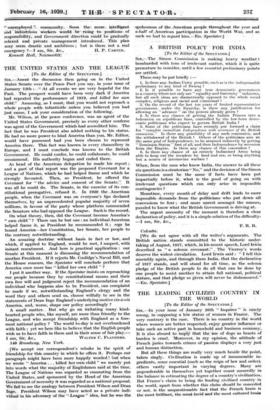THE UNITED STATES AND THE LEAGUE [To .the. Editor of
.the SPECTATOR.] .
Sm,—Anent the discussion then going on in the. United States -Senate -over the Peace Pact -you- say; in- your issue of January -12th- : ; -t` At all events- we are very . hopeful for the Pact. - The prospect would have been very dark if America had repeated the performance of 1919, and killed her own child." Assuming, as I must, that you would. not reproach a whole people with• infanticide unless you believed you had just cause, I ask your consideration of the following.
Mr. Wilson, at the peace conference, was an agent of the United States Government, precisely as every other conferee was agent of the Government whieh-had accredited him. The fact that he- was President also added- nothing to- his status. He had no more power to bind America than you, Mr. Editor, would have possessed had you been chosen to represent America there. This fact was -known in every chancellery in Europe, and I must conclude was known to the British Government. He could confer, he could collaborate, he could recommend. His authority began and ended there.
As head of the American delegation he made his report ; and a part-of that report was the proposed Covenant for a League of Nations, which-he-had helped frame and which he strongly favoured. Then, as President, he offered the Covenant for " the advice and consent of the Senate." It was all he could do. -The Senate, in the exercise of its con- stitutional prerogative, _refused it. In 1920 the , American people, when the, Covenant was on everyone's lips declared themselves, by an unprecedented popular majority of seven millions, in favour of the party whose platform, commended the Senators who had opposed the League. Such is the record.
On what theory, then, did the Covenant become America's " own child " ? There can be but one : an individual American helped . frame it, as President he. recommended it.; ergo he bound .America--her- Constitution, her Senate, her people to the contrary notwithstanding. .
An amazing doctrine without . basis in fact or law, and which, if applied to England, mould be met, I suspect, with instant resentment. And here is practical application : our Senate at this moment is diticussing the recommendation of another President. If it rejects Mr. Coolidge's, Naval Bill, and the House concurs, the Spectator will conclude perforce that America once more has "killed her own child " ?
I put it another way.. If the Spectator insists on reproaching our. people because they by constitutional means and their own free will and judgment reject the recommendation of an individual who happens also to be President, can complaint be made if we, notwithstanding England's clergy and the word they and others send us, choose wilfully to see in the statements of Dean Inge England's underlying motive vis-a-vis America, and, worse, shape our policy accordingly ?
A small matter.. But why go on irritating many kind- hearted people who, like myself, are more than friendly to the League, and who accept friends.hip with England as a fore- most national policy ? The world to-day is not overburdened with faith ; yet we here like to believe that the English people wish us to have faith in them and in their sense of fair
[We accept our correspondent's rebuke in the spirit of friendship -for this country in which-he offers it. Perhaps our paragraph might have been more happily worded ! but when we wrote " America:... killed her own child " we merely put into words what the majority of Englishmen said at the time. The .League of Nations was regarded as emanating from the United States, and sponsored by -the Head of the Ameriean Government of necessity it was regarded as a national proposal. We fail to see the analogy between President Wilson and,Dean Inge. President Wilson may have acted as a priVate indi,. vidual in his advocacy of the "• League ?' idea, but he- was the • apokesnian,of the American people. throughout the year and a-half of.American participation in -the World War, and as
such we had .to regard him.---LEn. Spectator.] - - • •










































 Previous page
Previous page